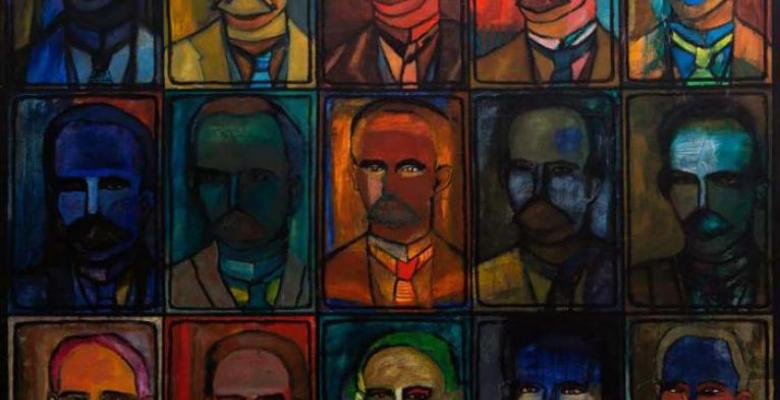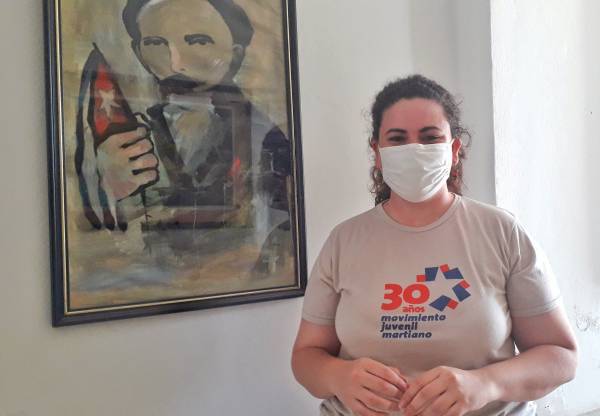José Martí, a Symbol of…? (I)
especiales

These days, much has been said and written about José Martí. The commemoration for the 170th anniversary of his birth is in the air, for good, in Cuban society.
However, we cannot ignore that, to this day, Martí is a politically and ideologically disputed symbol. Representations of the National Hero emerge —in networks and digital spaces, for example, but not only there— with the intention of revealing apparently contradictory ideas with certain aspects of reality.

In an effort to shed some lights, Lil María Pichs Hernández answers a few questions on the subject. This young woman, coordinator of Martillando magazine and member of the National Board of José Martí Cultural Society, has reached interesting conclusions about how the figure of the Apostle is looked upon today.
Is Martí's ideology currently manipulated?
I think so. His name, what he represents, passages of his life and work are manipulated. It’s not a current phenomenon. Since he lived, his words were distorted. He was misunderstood by many. There were legitimate misinterpretations from people who really didn't understand him. Of course, there were also intentional, deliberate misinterpretations to undermine his project of a Free Cuba.
Many of the opinion lines that are trying to be generated today are similar, but there are new ones: what he thought of the single party, of the communists, what he would think of the way in which the country is run. These are tricky points, elements that Cuba's enemies try to put out of context to say: Martí is against the way things are happening today. And it doesn't make much sense: Martí was farsighted, but he wasn’t a fortune teller.
And symbolically?
What those who deliberately manipulate him ultimately seek is to deconstruct him as a symbol and paradigm. They want to destroy the symbol that pioneers put a flower on; the intellectual author to Moncada barracks attack; Fidel's teacher; the very symbol of the Revolution. We see him on social media all the time.
What passages of his thought are most frequently distorted?
For example, trying to separate him from Karl Marx, to this purpose are recalled a few criticisms he said at some point. They bring forth excerpts, one or two lines: the only thing they can do, because in the text where he criticizes him later, he highlights his qualities as a leader, or talks about the fact that it’s not just about Marx, but the fact that no European or American author has answers to the problems of Latin America and Cuba. But they are only interested in the segment where he says that Marx was unsuccessful.
Another characteristic is when he is quoted openly speaking about socialism. “The socialist idea, like so many others, carries two dangers: that of foreign, confused and incomplete readings, and that of the arrogance and concealed rage of the ambitious, who, in order to rise up in the world, begin faking, in order to have shoulders to step onto, frantic defenders of the helpless." This is a fragment of a beautiful text that ends by saying that an idea so fair in its essence is not judged by stains. However, it only refers to the first idea.
Another example is the conception of a Martí fan of the United States. Phrases such as: “You can breathe freely, because here freedom is the foundation, shield, essence of life. Here one can be proud of his species. Everyone works, everyone reads. And they do not quote: "(...) material power, like that of Carthage, it grows rapidly, and quickly declines." It's almost the same paragraph! But that second phrase is not mentioned by them, we also work hard every day.
Another way is Martí as a poet: they try to separate him from all political causes. It’s been a tendency to try to remove all political issues from Marti’s poetry, taking advantage of the fact that he is a great figure of modernism. It’s a demobilizing vision —quite bleak and unsustainable—, used in the first years of the republic, to the harm of a paradigm of national liberation.
These distortions are frequent in social networks, what happens in academic spaces?
From this point of view, there are studies based on ideas such as the annexationist Martí, the racist Martí, and, of course, the single party matter. They assert that the party was created by Martí for the war, but that he would not have wanted a single party after triumphing.
Some sound like conspiracy theories, based on what historians say is wrong to do: speculate about things that weren't. Presenting as a reality something that was not is completely contrary to the scientific nature of History. But the so-called specialists who have a specific political objective and are willing to twist science are not interested in that.
What they seek is to criticize Cuba, demonize its socialist project and separate Martí from what this country represents in terms of confronting imperialism and injustice. This society is full of problems due to its own fresh character, under construction, unfinished; but also because of the war and hostility faced, even, since before the project was declared socialist.
We must take into account the manipulations that Martí's ideas suffer are aimed at separating them from everything related to the government, the State, and the achievements of the Revolution.
Translated by Amilkal Labañino / CubaSí Translation Staff













Add new comment